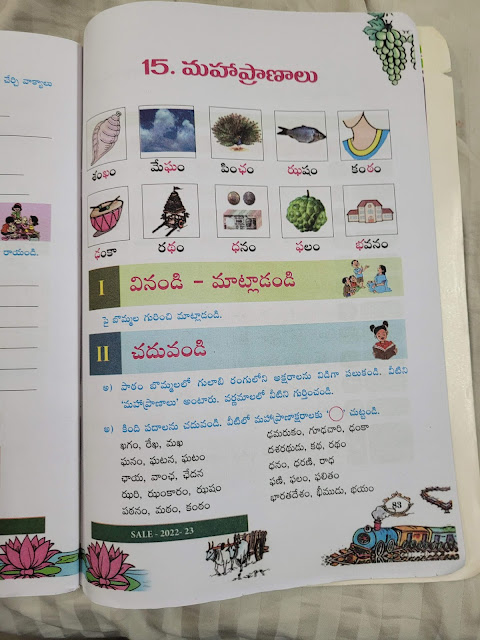14. గౌతమి సైకిలు - Gautami cycle - Gautami bicycle
గౌతమి సైకిలు ఎక్కింది - Gautami cycle ekkindi - Gautami rode bicycle
టౌనుకు దౌరా వెళ్ళింది - townuku daura vellindi - went for a round to town
తోవలో టైరు పగిలింది - tovalo tire pagilindi - on the way tire burst
సైకిలు చైను ఊడింది - cycle chain oodindi - bicycle chain came off
గౌతమి సైకిలు ఆపింది - Gautami cycle aapindi - Gautami stopped the bicycle
దిక్కుతోచక నిలుచుంది - dikkutochaka niluchundi - stood clueless
మౌలాన చాచా వచ్చాడు - Maulana chacha vachchadu - Maulana uncle came
"ఏమైంది?” అని అడిగాడు - "Emaindi?" ani adigadu - asked "What happened?"
చైను, టైరు చూశాడు - chainu, tire choosadu - looked at chain, tire
రెంటిని బాగు చేశాడు - rentini bagu chesadu - fixed both
సైకిలు బాగై పోయింది - cycle bagai poyindi - bicycle became fine
రై రై మంటూ ఉరికింది - rai rai mantoo urikindi - went off saying "Yay, yay"
Note:
ekkindi/vellindi etc end in ‘ndi’ since the subject is female singular.
choosadu/adigadu end in ‘adu’ since the subject is male singular.
Diff between ‘ku’ and ‘nu’:
‘ku’ for indirect object.
‘nu’ for direct object.
### For "కు" (ku) - Dative Case
1. **Telugu:** నేను మిత్రుడికి పుస్తకం ఇచ్చాను.
- **English:** I gave a book to my friend.
- **Hindi:** मैंने अपने दोस्त को किताब दी।
2. **Telugu:** అమ్మ పిల్లలకు కథ చెప్పింది.
- **English:** Mother told a story to the children.
- **Hindi:** माँ ने बच्चों को कहानी सुनाई।
### For "ను" (nu) - Accusative Case
1. **Telugu:** నేను ఆపిల్ను తిన్నాను.
- **English:** I ate an apple.
- **Hindi:** मैंने एक सेब खाया।
2. **Telugu:** వాడు లేఖను చదివాడు.
- **English:** He read the letter.
- **Hindi:** उसने पत्र पढ़ा।





